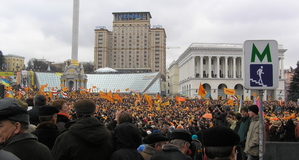Featured Article:The Barents Sea Conflict: Russia and Norway Competing Over Fossil Fuel Riches in the ArcticNegotiation AtmosphereConflict / Cooperation. The Media frequently portray a picture of conflict with MacAlister (2010) stating that the peaceful equilibrium in the arctic could be altered by climate change in a 'race of temptation for exploitation of natural resources.' Sparking news of a military conflict emerging was the successful attempt by Russia to plant a Russian flag at the bottom of the Barents Sea in 2007 using a submarine, while Vladimir Putin stated that the Arctic is an 'area for cooperation and dialogue' (MacAlister, 2010). The concern for military conflict is not completely unfounded as Bannon and Collier (2003) note that approximately '50 current armed conflicts have strong links to natural resource exploitation.' More recently Nicola (2010) provides evidence that 'relations between both nations are nevertheless strong, with Moscow inviting Norway's StatoilHydro to join Gazprom in tapping... fossil fuel depots....' It appears that throughout 'Barents Sea conflict' the negotiations have passed through stages of conflict as well as cooperation. In the end the agreement was signed under cooperating terms. Power / Dependence. In a geopolitical conflict, the nature of power and resulting dependence upon it is given by either political power or territorial control. This negotiation in particular also gives rise to 'expertise & technological resources' as a determinant of power. Provisional Agreements in the conflict attributed more territory to the Russian side, and Russia with its significant military strength could easily overpower Norway in an armed conflict. Austvik (2007) points out that 'Norway is a mouse compared to the Russian bear'; however, he also concedes that Norway possesses a highly competent, professional and specialised petroleum cluster. The Norwegian developed sub-sea technologies and horizontal drilling techniques are not available to Russia which positions Norway well for the development of oil fields in the Barents Sea. In other words, Russia depends on the Norwegian technology to access its own resources, unless it would side with the Americans who possess similar expertise. In fact Austvik (2007) points out that 'Russia could (and should) invite a Norwegian company to play the role as operator of [its] fields.' Combined with the political backing of the European Union, and military support of Germany and the UK if necessary (as discussed above), Norway is on at least equal footing with Russia in terms of power, in fact it almost seems as if Russia is dependent on Norway to a certain extent. Mannix and Neale (1993) argue that studies have shown that 'negotiators with an equal power balance will reach agreements of higher joint gain than negotiators with an unequal balance of power.' It appears that the territorial aspects balance out with the technological ones, i.e. both parties are equally dependent on each other, so following Mannix and Neale a joint agreement of high gain should be feasible.Relationship / Trust. The questions of knowledge, good relations and confidence building become important for how Norway and Russia can cooperate in the Barents region' (Austvik, 2007). Considering the fact that these negotiations were ongoing for over 40 years, one may argue that this was an extended period of building up trust and overcoming conflict to enable cooperative behaviour. Media. The high level of attention of both NGOs and environmental pressure groups regarding the industrialisation of the Arctic has frequently been reflected in the media. Public awareness of these issues is at its highest and neither country feels the need to be reflected badly in the media. To this end, Henriksen and Ulfstein (2011) argue that 'it is not coincidental that an agreement was reached in a period of significant international attention on the Arctic. This... was probably influential for the parties to reach an agreement at this stage.' If this is true, then the effect of media attention on the speed of negotiations and possibly the detail and content of the resulting agreement is vast. Further research is required to confirm this indicative observation. Culture as a Moderator in NegotiationsSince this negotiation has been ongoing for over 40 years, a number of different negotiators will have been involved from each country. Given the notion of national culture heterogeneity, the discussion on national culture may be considered limited in application to the negotiation outcome since the negotiators may behave differently from what their national culture infers. Salacuse (1998) argues that we need to take account of both professional and national culture when analysing negotiation behavior. He also claims that 'when faced with a cultural difference, negotiators from different cultures might seek to rely on their professional culture in trying to bridge the national cultural gap' (Salacuse, 1998). National Culture. Lewis' LMR framework (Figure 2) illustrates how national cultures vary. Although both nations are situated on the continuum between linear-active and multi-active cultures, Norway clearly shows more tendencies towards linear-active behavior and Russia towards multi-active behavior. This indicates that Norway is likely to follow a linear agenda with a clear task orientation in this negotiation, whereas the Russians are likely to act impulsive and place greater value on a relations rather than a task focus. This clash may be of great significance as Metcalf and Bird (2003) noted that the negotiation's focus on task or relationship is of grave importance.
Expanding on this classification, Ott's (2011) research predicts either bargaining scenario 4 or 6, depending on who would be the seller or buyer in this negotiation. Developed for business scenarios, Ott's seller/buyer classification is difficult to apply to geopolitical contexts. The former would indicate a high frequency and quantity of proposal rejections, cooperation would only ever occur after a long period of time and the differences in time perception and negotiation styles will lead to conflict. Scenario 4 therefore reflects an accurate representation of what has actually been happening. This would indicate that Norway is the Seller and Russia the buyer; -does this imply anything about the power dependency between the two parties? Scenario 6 on the other hand predicts that the negotiation may be terminated due to a show of power buy the buyer (Norway in this case). It also predicts that cooperation may occur at the beginning of the negotiations, neither of which actually took place. Therefore in terms of Ott's (2011) research, Russia can be classed as a Buyer, which could infer that Russia is dependent on Norway, the seller. A further contribution to the discussion of national culture is made by Hofstede (2001) who assessed national cultures along 5 criteria: the Power Distance Index (PDI), which measures expectations about the distribution of power; Individualism versus Collectivism (IDV); Masculinity versus Feminitity (MAS); the Uncertainty Avoidance Index (UAI), which measures "a society's tolerance for uncertainty and avoidance;" and Long-term versus Short-term orientation (LTO). Results for Russia and Norway are summarized in Table 1:
Hofstede's results in the IDV dimension again show the importance of relationships to the Russians, whereas the Norwegians are more self-centered and private opinions count for more than those of society. The UAI dimension shows that the Russians are threatened and uneasy by conflict so are likely to give in under sustained pressure, they also require a need for agreement. Norway on the other hand is fairly balanced on this dimension, but their LTO indicates the need for stability, hence structured agreements may be favoured avoiding uncertainty. PDI contributes little valuable insight to negotiations. Considering all these pieces of cultural research in unison allows us to draw the following conclusions. Culture in this negotiation scenario mainly influences power aspects as well as the time horizon of this negotiation and provides justification for drawn out conflict. Norway appears to have greater power in this negotiation than Russia; the Russians are dependent on achieving a relationship, which is not as important to Norway so can only be achieved by making concessions. Ott's work indicates that Norway is the 'Seller', which alongside Austvik's (2007) recommendations allows me to conclude that Norway has greater power. Given the obvious differences in national cultures, this explains the initial 'distributive bargaining' stance in the negotiations. Over time, the two countries' negotiators will have learned to either 'bridge the cultural gap' or to rely on their professional culture to bring this negotiation to an end as both eventually desire a structured agreement to the conflict. The content of the agreement clearly shows that the final negotiation stance was integrative rather than distributive. To an extent the above also justifies the influence of media attention, as the Russians in particular want to avoid conflict and hence may have been more likely to give in to Norway's demands, due to increasing media pressures.Continued on Next Page » Suggested Reading from Inquiries Journal
Inquiries Journal provides undergraduate and graduate students around the world a platform for the wide dissemination of academic work over a range of core disciplines. Representing the work of students from hundreds of institutions around the globe, Inquiries Journal's large database of academic articles is completely free. Learn more | Blog | Submit Latest in International Affairs |















